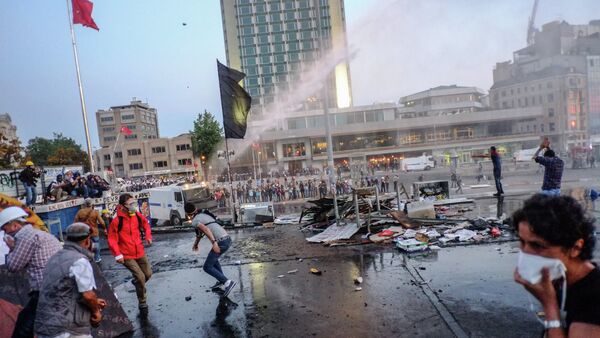MOSCOW, September 29 (RIA Novosti) - The Erdogan administration and the ruling Justice and Development Party (AKP) in Turkey have been showing a continuous pattern of increased intolerance toward the opposition, public protest and liberal media in what is a sign of a general rollback in social freedoms, Human Rights Watch said in a report published Monday.
In the 38-page report, the watchdog organization hit out at the AKP government over its attempts to "curb the independence of the judiciary and weaken the rule of law" and "stifle corruption investigations" over the past nine months.
"The erosion of human rights through limitations on media freedom, clampdown on protest, and further loss of trust in Turkey's politicized criminal justice system have deepened political polarization in the country," HRW stressed.
It traced the Erdogan administration's rollback on social freedoms to anti-government uprisings in Istanbul's Gezi Park in 2013, when a violent crackdown on sit-in protests over the area's planned redevelopment sparked massive demonstrations across the country.
HRW said that thousands in Turkey still faced legal proceedings for their participation in these protests, whereas only few police officers that used teargas and batons indiscriminately against protesters were brought to account for their subsequent deaths and injuries.
The human rights group also lashed out at the Turkish government, saying its handling of the December 2013 corruption scandal that implicated high-ranking officials and their families was inadequate. Most recently, two investigations into corruption allegations have been closed and several police officers that probed the cases have been arrested.
The Erdogan administration has also attempted to silence social and mass media that have been reporting on the corruption scandal. It has further tightened the controversial Internet censorship law adopted in 2014 and revised its intelligence law, granting broader access to personal data to the National Intelligence Agency (MIT).
HRW warned Ankara that its crackdown on human rights could hurt the ongoing peace process with the Kurdish population and the Kurdistan Workers' Party (PKK), which is deemed as one of the few positive steps taken by the Turkish government.
"The embryonic Kurdish peace process offers the greatest possibility for improving Turkey's human rights record by correcting the rights deficit for Kurds that lies at the heart of the conflict," the organization said in the comprehensive report, adding that "a wider rights-based view" of the settlement was needed for this move to affect other watchdog groups in Turkey.



